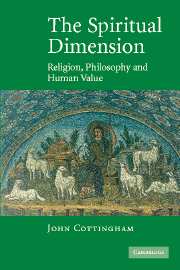Book contents
- Frontmatter
- Contents
- Preface and acknowledgements
- 1 Religion and spirituality: from praxis to belief
- 2 Religion and science: theodicy in an imperfect universe
- 3 Religion and value: the problem of heteronomy
- 4 Religion and self-discovery: the interior journey
- 5 Religion and language: emotion, symbol, and fact
- 6 Religion and the Enlightenment: modernist and postmodernist obstacles
- 7 Religion and the good life: the epistemic and moral resources of spirituality
- 8 Religion and pluralism: which spirituality?
- Bibliography
- Index
6 - Religion and the Enlightenment: modernist and postmodernist obstacles
Published online by Cambridge University Press: 24 November 2009
- Frontmatter
- Contents
- Preface and acknowledgements
- 1 Religion and spirituality: from praxis to belief
- 2 Religion and science: theodicy in an imperfect universe
- 3 Religion and value: the problem of heteronomy
- 4 Religion and self-discovery: the interior journey
- 5 Religion and language: emotion, symbol, and fact
- 6 Religion and the Enlightenment: modernist and postmodernist obstacles
- 7 Religion and the good life: the epistemic and moral resources of spirituality
- 8 Religion and pluralism: which spirituality?
- Bibliography
- Index
Summary
Ich mußte also das Wissen aufheben, um zum Glauben Platz zu bekommen
(‘So I found it necessary to go beyond knowledge in order to make room for faith’).
Immanuel Kant.THE STIGMA OF METAPHYSICS
In forming a religious outlook (the previous chapter argued) we build up a multi-faceted picture of reality, the elements of which gradually begin to cohere together in a mutually reinforcing way. To change the metaphor, a religious worldview is not an isolated set of doctrines, but a complex retiform structure, a fine-meshed net of praxis and belief and commitment that links together in a coherent fashion many diverse aspects of our human experience. Such a worldview finds expression not just at the narrowly intellectual level, but in a rich array of symbolic and figurative discourse; to use and to understand such discourse is to appreciate that in religion as in many of the most important areas of human life, meaning operates not through bald statements that correlate one-to-one with the facts they purport to describe, but rather through an intricate process of layering, where our understanding is constantly enriched by the interplay of conscious and unconscious resonances and allusions.
Drawing attention to this ‘fuller and riper’ mode of understanding may irritate those who are professionally committed to reducing all philosophical discourse to an austere, ambiguity-free template modelled on the kinds of language used in natural science; but while there is nothing wrong in itself with such austere language, there seems no sound reason to stretch it beyond its natural province.
- Type
- Chapter
- Information
- The Spiritual DimensionReligion, Philosophy and Human Value, pp. 102 - 126Publisher: Cambridge University PressPrint publication year: 2005



